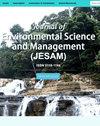Isolation and Characterization of Polysaccharide- Degrading Microbes from Compost Samples
IF 0.3
4区 环境科学与生态学
Q4 ENVIRONMENTAL SCIENCES
引用次数: 1
Abstract
This study isolated and identified novel microbial polysaccharide degrading species involved in composting process. Bacteria were isolated from different composting samples from Lahore Compost Private Limited, Lahore, Pakistan. Physico-chemical analysis of compost samples made from municipal waste were collected at 15-day interval during the composting process. A total of 55 bacteria were isolated and identified using morphological and biochemical characteristics. Out of 55 isolates, 26 mesophilic and 14 thermophilic had cellulose degrading potential. Out of 26 mesophyllic bacterial isolates, 20 were found cellulolytic. The isolated bacteria and fungi were identified morphologically and biochemically. The highest potential to degrade cellulose was recorded from four Bacillus strains. Molecular characterization of potential cellulolytic bacteria by 16S rRNA was performed. Bacillus sp. were found as the most prevalent cellulolytic bacteria in composting process. Fungi were also isolated and characterized morphologically and microscopically following techniques. The potential cellulolytic fungal isolates were Aspergillus fumigatus, Mucor sp., Saccharomyces sp., and Aspergillus niger. The results of this study would be helpful in highlighting the potential role of different microbes involved in enhancement of the composting process. These microbes can be used for the preparation of microbial inoculum based on their polysaccharide cellulose, bacteria, composting degrading ability.堆肥中多糖降解微生物的分离与特性研究
本研究分离并鉴定了参与堆肥过程的新型微生物多糖降解种。从巴基斯坦拉合尔的拉合尔堆肥私人有限公司的不同堆肥样品中分离出细菌。在堆肥过程中,每隔15天收集一次城市垃圾堆肥样品的理化分析。通过形态学和生化特征对55株细菌进行了分离鉴定。55株菌株中,26株嗜中温菌和14株嗜热菌具有纤维素降解潜力。在分离的26株叶肉细菌中,有20株具有纤维素水解性。对分离的细菌和真菌进行了形态和生化鉴定。4株芽孢杆菌对纤维素的降解潜力最高。利用16S rRNA对潜在的纤维素水解菌进行分子表征。芽孢杆菌是堆肥过程中最常见的纤维素分解菌。真菌也被分离出来,并在形态学和显微镜下进行了表征。潜在的纤维素分解真菌分离株为烟曲霉、毛霉、酵母菌和黑曲霉。本研究的结果将有助于突出不同微生物在提高堆肥过程中的潜在作用。这些微生物基于其多糖、纤维素、细菌、堆肥降解能力,可用于制备微生物接种物。
本文章由计算机程序翻译,如有差异,请以英文原文为准。
求助全文
约1分钟内获得全文
求助全文
来源期刊

Journal of Environmental Science and Management
ENVIRONMENTAL SCIENCES-
CiteScore
0.90
自引率
0.00%
发文量
10
审稿时长
2 months
期刊介绍:
The Journal of Environmental Science and Management (JESAM) is an international scientific journal produced semi-annually by the University of the Philippines Los Baños (UPLB).
JESAM gives particular premium to manuscript submissions that employ integrated methods resulting to analyses that provide new insights in environmental science, particularly in the areas of:
environmental planning and management;
protected areas development, planning, and management;
community-based resources management;
environmental chemistry and toxicology;
environmental restoration;
social theory and environment; and
environmental security and management.
 求助内容:
求助内容: 应助结果提醒方式:
应助结果提醒方式:


